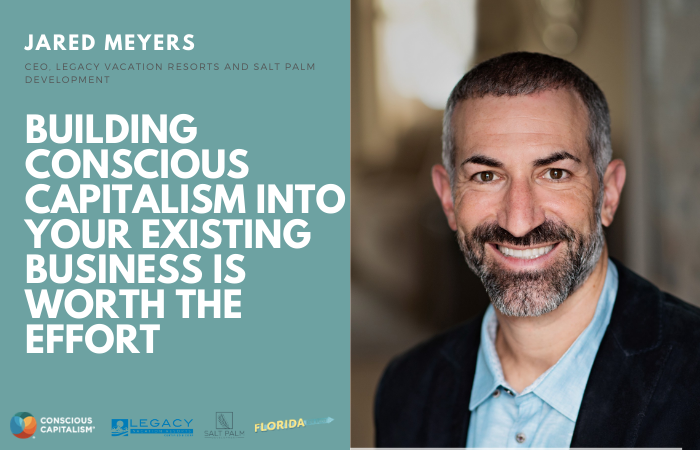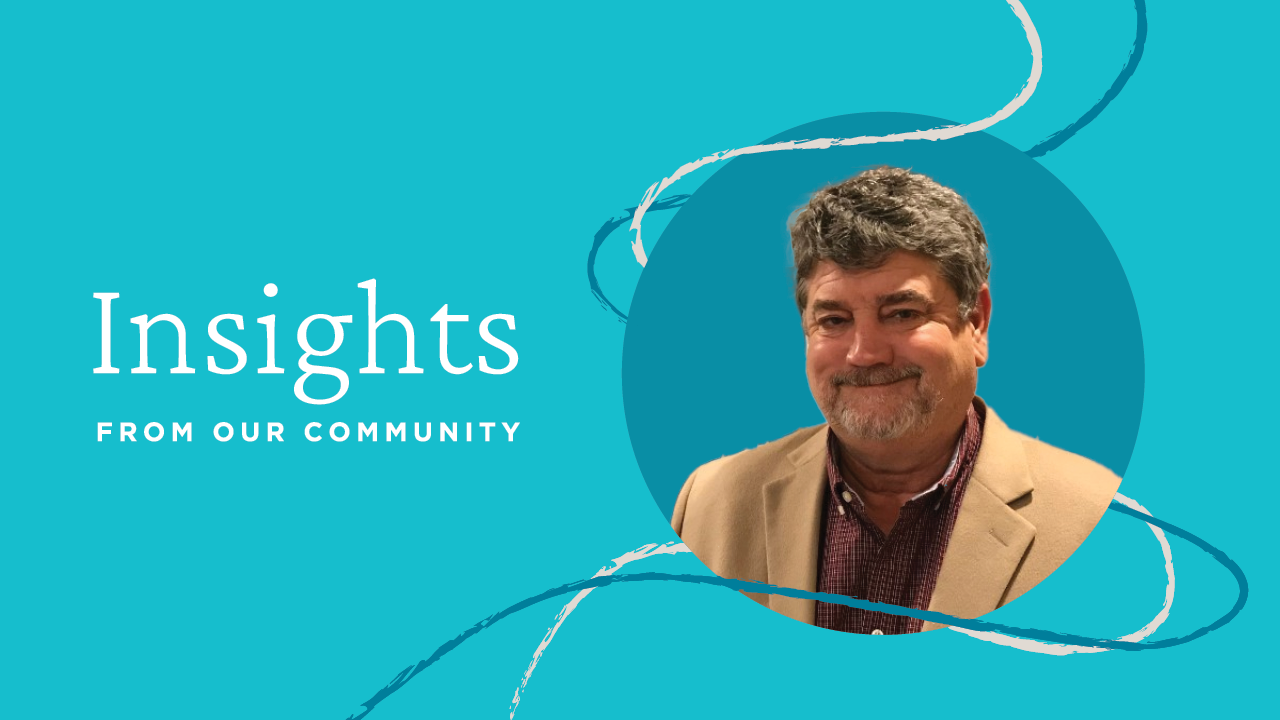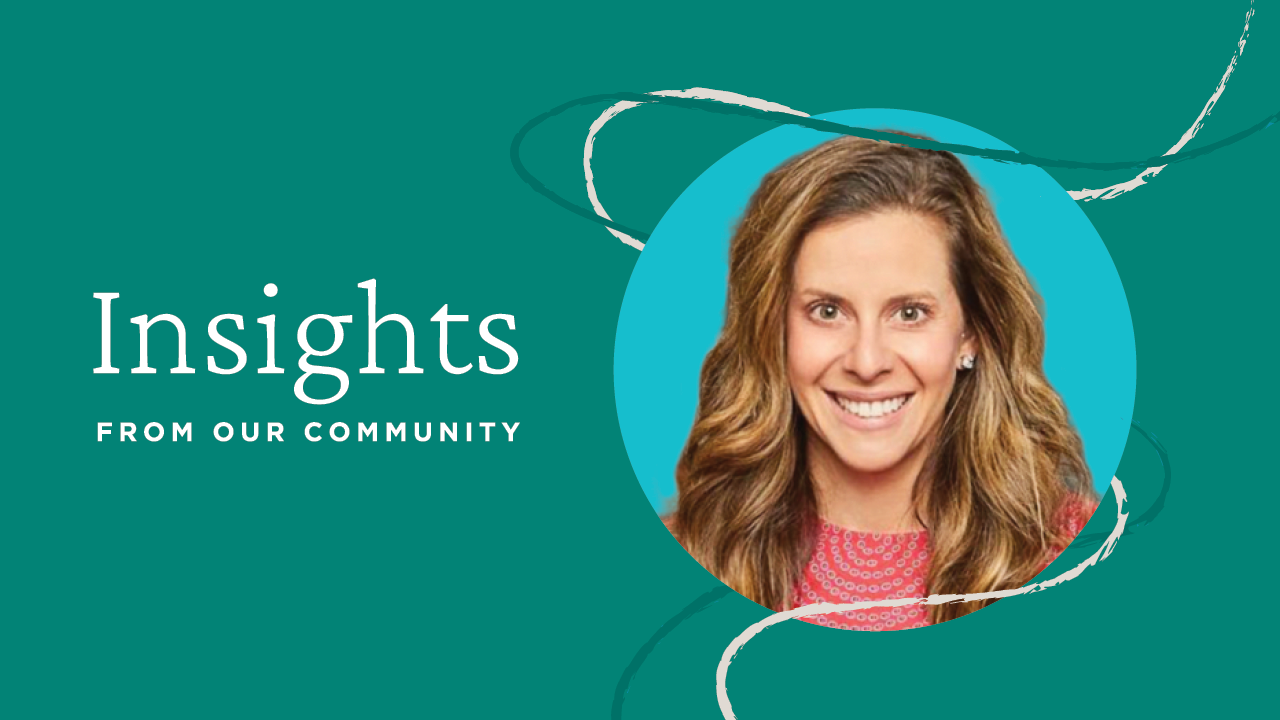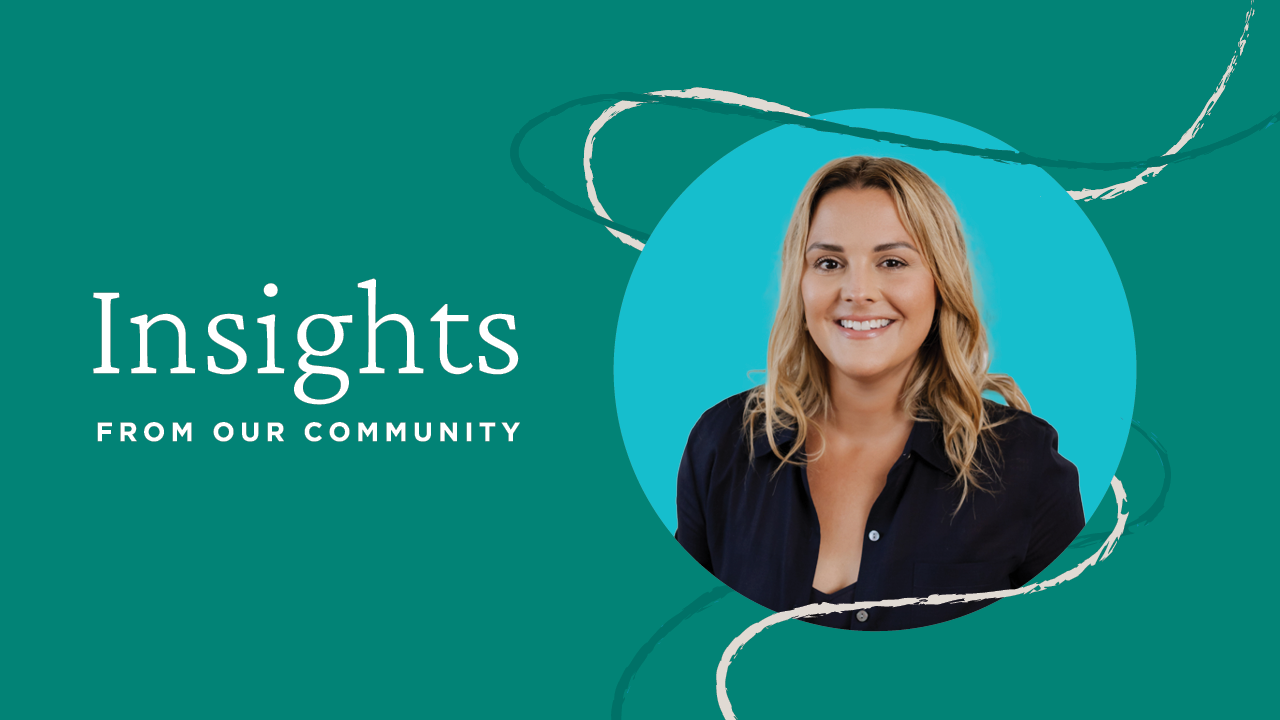Meet Jared
Jared Meyers is the Chairman and/or Co-Founder for several companies headquartered in Florida. The most notable of these are Legacy Vacation Resorts, Salt Palm Development, Climate First Bank i/o, and Florida for Good. For the past 20 years, he has worked and owned companies in the hospitality industry. These operations spanned most of the United States and have involved a variety of disciplines including development, management, hospitality, and financial services. Jared believes that resources and capabilities exist to solve most of humanity’s problems and to achieve a prosperous future for all. To accomplish this, businesses must measure their impact, be transparent, and drive the responsibility revolution; and consumers must prioritize their spending and habits in alignment with these businesses. Profit is good when a business does good. The goal of the ‘For Good’ movement is to utilize business as a positive force and to foster collaboration between Conscious Capitalism, the B Corp Movement, and other responsible business networks and organizations.
It was just about 2 years ago when Jared Meyers realized he’s not just a capitalist; he’s a Conscious Capitalist. He tells us, “My upbringing in business was definitely a traditional capitalism kind of upbringing, but I had exposure to a lot of alternative concepts. For example, I was raised a full vegetarian and my mom’s side of the family was very naturalist and environmentally friendly. We always believed in trying to produce minimal waste and a lot of concepts that are more normalized now. But back then, they weren’t. It was impossible to find food when you were raised a vegetarian. In high school, we’d go through the drive-throughs we’d go to Burger King or McDonald’s and I’d say, ‘I’ll take a cheeseburger, hold the burger.’ And I would laugh and say, ‘No seriously. Just give me a cheese sandwich.’”
Jared’s career started with the family business, “I was constantly frustrated and disappointed with the values and ethics that were regularly present. I’d say the business very much fit the stereotype of real estate developers and I was in a constant struggle to try to be better and do better. It was only after we endured several years of litigation and going through Chapter 11 that I realized I was going to do things differently. I actually was really concerned that business couldn’t be done differently and could only have a negative impact. I thought that all businesses were basically extractive and doing harm. I needed to figure out if I wanted to stay in the business community or not, so I went on a journey for about eight years where I became more spiritual. I was really trying to tear myself down and rebuild and say, ‘Is there a different way to do things?’”
I was constantly frustrated and disappointed with the values and ethics that were regularly present. I’d say the business very much fit the stereotype of real estate developers and I was in a constant struggle to try to be better and do better. It was only after we endured several years of litigation and going through Chapter 11 that I realized I was going to do things differently.
Beginning the Journey
Jared took a step back from the day-to-day at his businesses, telling his leadership teams that he needed to do some personal work and he would be only as active as he needed to be. He tells us, “I started going down that spiritual path and really looking at the connection of everything and how nothing on the surface is all that it appears to be; that there’s always so much more to the picture. I wanted to know that everything I did in my life was going to tie into that. At the time I had two companies – Salt Palm and Legacy Vacation Resorts. Legacy was doing well; it paid for my lifestyle. Maybe not well by Conscious Capitalism standards at that point, but doing well financially, and I knew that we were well-intentioned; we weren’t there trying to do the wrong thing. But it wasn’t good enough. I felt like we were still a net-taker and not a net-giver. With Salt Palm, I decided to put half of our profits back into the community. That was somewhere to start. We are now close to 100% of our profits going back into the community, but it started out as an idea that I would just do that and if I could have one business that was doing good by how I understood it at the time and the other one doing good enough that would make me feel good.”
Despite this first step, it wasn’t enough for Jared. He was disgruntled and complaining all the time, a state he describes as unnatural. “I was riding that roller coaster. I’d think I’d figured it out, that I had found my purpose, and then I’d realize ‘Nope, that’s not it!’, so there was a lot of ups and downs and I found that I was complaining a lot about business and that things needed to be radically different and then I caught myself complaining. I’m not someone who complains; I’m someone who does. When there’s a problem, I find a solution. I don’t complain to people about it. So why am I not finding a solution? And that’s what motivated me to look for one.”
“I started doing research online, and that’s where I found B Corps. I was like this is too good to be true. I asked everyone who was a trusted advisor of mine at the time if they were familiar with this concept, and none of them had ever heard of it, or they had heard of it, but they didn’t understand it. It was hard because I didn’t really have any community around me to even get advice on how to get started. So I jumped in with the B Corp Impact Assessment to see what this was all about, and it really educated me on the role that our stakeholders should be playing in our decision process. I didn’t understand what Stakeholder Orientation was until after I took the impact assessment. Once I went through it, I said, ‘Oh! When I make a decision it’s not enough to think beyond profits; I have to have all the stakeholders in mind.’ I realized then that it was possible to intersect traditional business and how I thought about the world in the spiritual sense together.”
Changing the System from Within
Emboldened by this realization, Jared got to work. He tells us, “I started with Salt Palm, because it was simpler. Our team was smaller so we would need to work less hard at getting buy-in. As I was working through the process of getting our B Corp certification for Salt Palm, I kept telling everyone at Legacy all about what we were doing. We had just joined Conscious Capitalism, so I was forwarding emails and I was educating them about Conscious Capitalism without telling them we would soon be making all these changes at Legacy. I’m sure they were smart enough to see it coming down the path, but we didn’t talk that way. I didn’t say, ‘We’re going to do this six months from now. I just started getting them comfortable with the concept of what was going on. I was letting them know that you can actually do this and thrive. That was my starting point. And once Salt Palm was certified as a B Corp, I thought, ‘We can do this at Legacy as well.’”
Advice for Leaders Implementing Conscious Capitalism into their Companies
Jared was 100% committed to transforming both Salt Palm and Legacy to conscious businesses, but that didn’t make it easy. He shares a little bit about what that journey was like for him and his team. “I think it really depends on the company and how it was founded and how you’ve been hiring from day one. I started doing a lot of things, but I really had to force them to happen. I would work directly with our People and Talent Department explaining that this is something we need to do with our employees; this is something I really want to see. It was almost more like a board mandate. That wasn’t the ideal way to do it. I was forcing educational programs onto our team, but when you do it this way, you miss the wonderful brain power of your executives and management team to be thinking in that direction. It’s only as powerful as me at the end of the day and they’re just kind of carrying it out. So it was, I would say, it was a battle for a while and we actually became a B Corp even during all of that, but I felt like I shouldered a lot more than would be ideal and I knew that wasn’t sustainable over the long term.”
Here are some lessons that Jared learned through the process of transitioning his two companies into conscious businesses:
Listen to the inner voice, don’t be scared of it. “If I could go back and do it again, I’d probably have moved faster. Not too fast though, as that would actually cut against the whole concept of acting with compassion, but I think I waited too long to get started. My advice to someone looking to transition their company to a conscious business would be that you should act sooner and listen to that inner voice of yours and don’t be don’t be scared of it.”
Use common language. “Depending on the size and scope of your team, you are likely to have people with different education levels, life experiences, and even different first languages than you. When presenting these new ideas, you need to use examples that resonate with them and use words that are easily understandable, or your team will totally miss the shift. For example, we are based in Florida. Everyone in Florida knows how miserable it is to get in your car on a hot day and not be able to let their hot air escape from your car. So when we want to talk about greenhouse gases, we talk about this universal experience.”
Invite your leaders along with you, and expect that not everyone will want to take the same journey. “I was trying to massively change culture. And I realized that it was too difficult to do by maintaining all the same individuals in place, but that’s not where I started. My goal was to use education and training to bring everyone on the existing team along with us, and to use that process as a way for people to leave if this was no longer the right place for them. I tried not to be overly forceful with educating my team about conscious business practices; I wanted them to learn by sharing articles and stories about businesses that were doing well financially to drive home that it’s not just doing this to feel good. For some, they’re all in, and others have struggled. I had a frank conversation with one of my top executives. He said, ‘Jared, I don’t think at my age that I’m ever going to be as passionate about this as you are. I have a lot of years that have taught me to be the way that I am. I will never work against you on this. I will support you, but I’m just not waking up in the morning and thinking about this the way you are and you just need to know that.’ It was very honest, so I said, ‘That’s awesome that you’re sharing this with me, but how can you help me ensure that everyone else in the company is waking up and thinking about this because I trust you.’ So we are working on a plan for that right now.”
Rely on others who have gone on the journey before you. “It definitely would have helped if I had known people early on in the process who had also gone through this journey. Being able to reach out to people who have gone through it themselves for their advice would have been great. Because here’s the problem: If you’re not doing this in a conscious business community, then you’re doing it in a traditional business community. When you’re bouncing ideas around with people who think traditionally, they’re giving you traditional advice and they’re saying that stuff doesn’t work. If you can join a group or community of conscious business leaders that are practicing this way, I think the energy pushes you into that direction. You need to go learn and feel that energy to realize this is not just some collegiate concept that academics like to talk about; this is real. You need to bounce those ideas around with conscious business leaders so you can learn from them to get smart enough and good enough in the conscious space to say, ‘I can do this.’”



